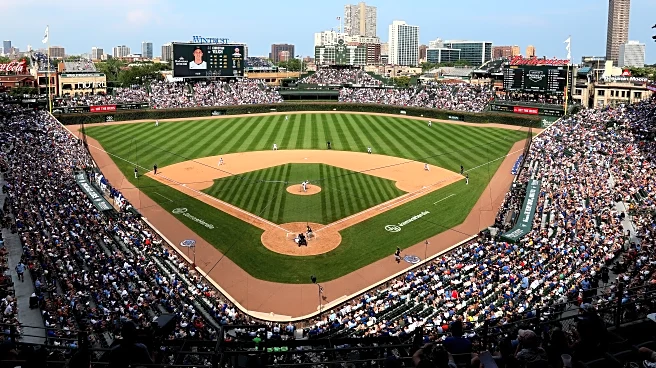Cubs attendance is on the upswing given the team’s performance so far this year, highly anticipating the Cubs’ first postseason appearance in a 162-game season since 2018.
The Cubs have announced 2,473,996
tickets sold through 66 home dates this year, or 37,485 per date. Both of those figures rank sixth in MLB behind the Dodgers, Yankees, Padres, Phillies and Mets (in slightly different order for the total and average). Note that the Cubs’ home attendance total includes two “home” games played in the Tokyo Dome. Total attendance for those two games was 84,732, or 42,366 per date.
In order to have three million announced tickets sold this year, for the first time since 2019, the Cubs would thus have to have 526,004 more announced tickets sold through the remaining 15 dates, or 35,067 per date. It seems likely that will happen. Attendance for weeknight dates in September generally falls off a bit with schools starting up again, but only five of the remaining 15 dates are on weeknights. It’ll be close.
The rest of this post examines pricing trends for the rest of the season, and as always, it’s by BCBer Lifetime Cubs Fan. The rest of this post is by LCF. (As you’ll see, LCF is more optimistic about the upcoming average attendance than I am.)
Since the last writeup a lot has changed – the Cubs are now in second place chasing the Brewers but firmly in the Wild Card lead. Cubs perfection at Wrigley for games I attend has ceased (they are now 14-2). And during that time, a lot of people enjoy games from the venerable ballpark at Clark and Addison. Through 64 home games at Wrigley Field (excluding the two “home” games in Tokyo), the average attendance at Wrigley is 37,335 per date as the Cubs continue their playoff push. In fact, eight of the last 20 games had over 40,000 in attendance. In 2024, the Cubs only had 11 games over 40,000 for the entire year. In 2025, with 15 home games remaining, 22 games have exceeded 40,000 in paid attendance.
Check out the chart below to see how 2025 attendance numbers continue to increase their separation from the running attendance averages in 2024 and 2023.

Now, let’s take a look at pricing trends. As a reminder, I look at Bleacher ticket prices (Seat Geek vs what season ticket holders paid) as they are the best section for analysis purposes given their general admission nature. The chart below shows, by series since the last writeup, the comparison of what a STH paid vs. what someone paid on Seatgeek 24 to 48 hrs prior to the game for bleacher tickets. As one might expect, the series against the Red Sox was the most expensive series from a secondary market perspective so far this season. The Baltimore series also had elevated pricing driven by the tributes for Ryne Sandberg during the Friday and Saturday games. What I thought was most interesting from a pricing perspective was the behavior of bleacher ticket pricing for the Brewers series. Three weeks prior to the games, bleacher tickets were between $65 to $70 per ticket on the secondary market. However, as the Brewers took over first place and kept winning and building their lead in the division to the point that no matter what the Cubs did in the five-game series, they mathematically could not be in first place by the end of the series, ticket prices dropped. Weather for the Brewers series was sub-optimal, and prices dropped even more as game time approached. (In my opinion, another factor for the price drop was due to schools starting — college, high school and grade school — making a mid-week game more of a challenge for many).
Check out the chart below for the pricing of each series

And check out this chart below for the average attendance of each series.

You see that the Brewers series had the lowest attendance amongst the last six at 36,158 per game (and only 35,455 per game if you exclude the makeup game from June 18). I wanted to compare that series attendance to another series around this time of year against the Brewers in a similar standings environment. I only had to go back to 2023 to get a comparison point for a series against the Brewers from August 28-30. That year, the Cubs were fighting to make the playoffs as a Wild Card team and trailed the Brewers by four games going into the series. Rather than 38,000+ for each game one might expect, the Cubs only averaged 33,387 in paid attendance per game, 2,771 less per game than this most recent series against the Brewers.
I am going to shift gears and focus on the five remaining home Series. As you can see in the chart below, it shows that each series on the secondary market is at least 50 percent more expensive from a percentage basis to what STHs paid, but, from a dollar perspective, none have reached an average of $100 per ticket —yet. In my opinion, now is the time to get tickets if you want to see the Cubs during their push to the playoffs. It’s possible I may end up being wrong, but I feel tickets for the Mets series and Cardinals series could jump more than 50 percent on the secondary market from where they are today. (I have been gathering data daily for all six games in the last homestand that I will include in my end of year writeup.) I have a strong feeling that those last six games are going to be more interesting than we might think.

End of season per game attendance prediction
For the remaining 15 home games, I am estimating the Cubs attendance is going to average about 37,500 per game, which would bring the total attendance for the 79 home games at Wrigley in 2025 to an average of 37,366 per game (which is 216 higher per game than my forecast made in July), or 2,951,914 at Wrigley. If the Cubs would have played 81 home games at Wrigley Field, attendance would have exceeded the three million mark there.
As always, interested to hear your thoughts and Go Cubs!!
P.S. I will pay the playoff invoice and renew my season tickets via the three-year agreement that was sent out last week. The decision was a notch more difficult to make than “no brainer.” One other comment about the postseason. Since for many, procuring tickets on the secondary market will be the only option, I highly recommend procuring tickets from Seat Geek vs. StubHub. I know of a friend who spent almost six hours on chat with StubHub customer service trying to resolve a ticket issue earlier this month. Someone had attempted to forward a ticket for an event later in the year when trying to fulfill their obligation. It was an absolute mess.
Seat Geek is the official MLB partner, I have yet to hear that first complaint regarding tickets purchased on Seat Geek, but for StubHub, I have heard numerous nightmares and appears to be getting worse.









